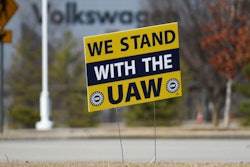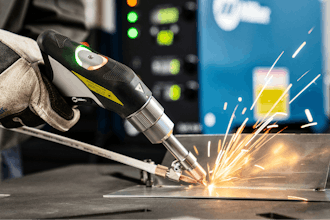PORTLAND, Ore. (AP) — Despite improvements in worker rights laws in China, Nike Inc. says significant problems remain there in working conditions and with managers not meeting Nike's standards.
Problems the athletic footwear and apparel giant listed in its first corporate responsibility report to focus solely on China include inadequate management, excessive overtime and workers using false documents to get jobs.
Nike said it decided to release a country-specific report because the 2008 Olympics in Beijing are attracting so much attention to China.
Nike spokesman Alan Marks said the problems highlighted in the report are ''consistent with the problems we face globally.''
But the report also states that ''corporate responsibility is a relatively new, rapidly evolving business practice in China. Adoption and understanding vary widely.''
China is crucial to Nike: Roughly one in three pairs of Nike shoes is made there. The company contracts with 180 manufacturers employing more than 210,000 workers in China, primarily young women who have moved from the countryside into cities for work.
Critics say the report shows continued shortcomings at Nike on labor rights. Labor activist Jeff Ballinger says Nike still positions itself heavily in countries where workers don't or can't unionize or managers won't bargain to meet worker needs.
''They are hanging on to this wishful thinking kind of other world,'' Ballinger said.
Susan Aaronson, an associate research professor at the schools of business and international affairs at George Washington University, praised the company for the report and commended environmental and other improvements the company made in its business in China. But she said labor concerns will remain serious in China for some time.
''All the incentives are for companies not to enforce the labor laws in China,'' she said.
After years of foreign pressure on China to improve its labor legislation, the country passed two new laws in 2007 that are intended to improve worker rights.
One that went into effect this year sets higher standards for labor contracts, use of temporary workers, layoffs and other employment conditions. Some hoped the move would encourage independent unionization in the country. Roughly half of Nike's contract employees in China belong to the country's only government-approved union.
A second law expands anti-discrimination protection for migrant workers and those with infectious diseases, two classes of people who had not been protected from bias.
The report shows there are problems at Nike contract facilities, including management not understanding or implementing moves to meet Nike's minimum standards.
Other problems include falsifying documents such as payroll records, a practice that can hide excessive overtime and inaccurate payment of wages — and help keep prices low.
In many cases, there were problems with workers using false identification as they compete for limited jobs.
A self-assessment program found 167 cases of workers who were under the minimum age to work but are now 18 or older. There were only two current cases of workers in Nike contract facilities under age 18, according the report. There were more than 1,000 other cases of people who were of age but had incorrect information on their identification.
''Although we understand that it is often a slow, incremental process to bring about change, we strongly believe that there is much more that can be done,'' the report states.
Nike said improving conditions for workers throughout its global supply chain ''continues to be one of our greatest priorities.''






















